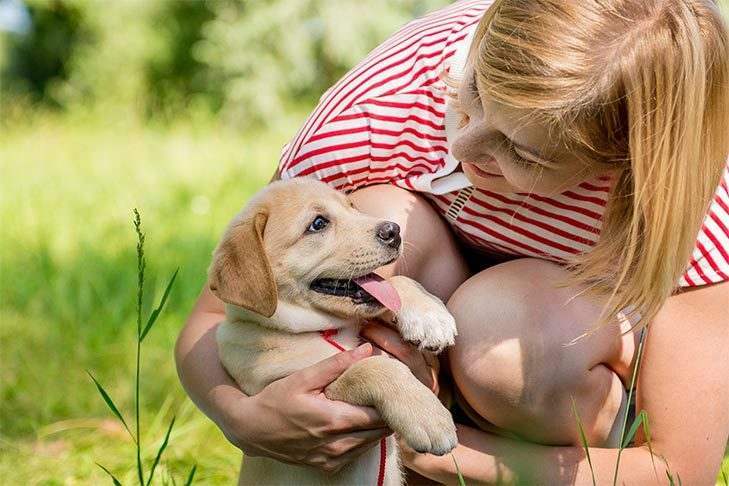

AKC is a participant in affiliate advertising programs designed to provide a means for sites to earn advertising fees by advertising and linking to akc.org. If you purchase a product through this article, we may receive a portion of the sale.
Before you welcome a new puppy into your home, you’ll need to make sure your space is ready for them. But raising a puppy isn’t easy. Puppies require a lot of attention and care, so making a checklist of what you’ll need is suggested, and picking up these basics for your new puppy is a great place to start.
It can be helpful for puppies to use harnesses, especially if they’re learning to walk on the leash. Dog harnesses will help not tug at their neck, especially if they’re still lunging during walks. Harnesses also make it easier to control your puppy when you’re out.
Some reflective harnesses also have strips that make your puppy easier to see in low light conditions. They’re perfect for walking early in the morning or in the evening.
Training leashes are great options for your new puppy. You’ll want to teach them how to heel and walk without tugging on the leash, so training leashes are ideal. They’re made for this stage of dog-walking.

They’re also good options for keeping your puppy close when playing in the backyard. Longer training leashes allow your dog to run around at a greater distance, but make sure that your dog is never left unsupervised.
Just like we love our beds, puppies need a place to sleep too! Dogs all have different tastes, so it might take a few tries to figure out where your puppy is most comfortable taking naps. Dog beds are classic options, and come in many different variations. Bolster dog beds can help puppies that move a lot in their sleep stay put, and elevated dog beds are good options for beds that are off the ground, but aren’t ultra-fluffy. Other dogs might love that fluffy dog bed option — it all depends on the dog.
Some dogs prefer being closer to the ground. Getting a dog blanket or a thinner dog bed might make them feel more comfortable.
Puppies are going to be teething, so aside from regular adult dog chew toys, you’ll need puppy teething toys as well. Puppy teething toys are different than regular dog toys because they help relieve pain in your puppy’s gums. It’s also a great way to keep them occupied!
Your puppy is going to be learning a lot of new things early on in their life. What better way to help these stick than giving them training treats as positive reinforcement? Figuring out which treats your puppy likes is a great way to help them learn, too. Some treats even help with puppy teething!

Starting your dog’s dental care routine early isn’t just beneficial to their health. Brushing your puppy’s teeth early will help them get used to the feeling. Dog toothbrushes are probably the first tool you’d think of for dog dental care, but they aren’t the only one. Puppy dental water additives help with plaque, and can be added to your puppy’s water.
Dog dental treats are also a helpful tool to making sure your puppy’s teeth are in tip top shape. Dog dental wipes, which also come in finger brush form, are a good way to get your dog’s teeth clean and fresh.
When you’re training your puppy, housetraining is a big part! You don’t want them to have accidents, so getting started early on will help them get into a good routine. Some good things to have when you start potty training your puppy are a crate to help reinforce a schedule, puppy pads, and urine detectors.
You can’t always know when they’re going to have an accident, so when you smell it but can’t find it, urine detectors will come in handy. You’ll also want to pick up some poop bags for walks and bathroom breaks.

Your puppy will inevitably grow, and for some breeds, this change is fast! While you’re giving them puppy food, they’re going to need something to eat it out of. Elevated dog bowls are a great choice for dogs to help reduce the strain in their neck. But dog bowls can also change with your dog! If your puppy is expected to grow quite a bit, try an adjustable dog bowl that will work for all stages of life.
When you bring your puppy home, you may consider only letting them access certain areas of your home at first, gradually increasing where they’re allowed to go. Creating boundaries for your dog is important, especially early on. This could mean crating your puppy at certain times of day, or restricting their access to certain rooms with puppy gates.
If they like to go on surfaces like your bed, you can also help make the jump easier for them with a dog ramp or dog stairs. These are create for bridging higher surfaces, including couches.